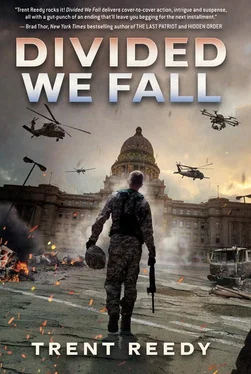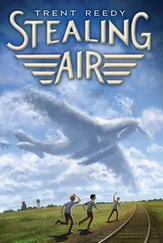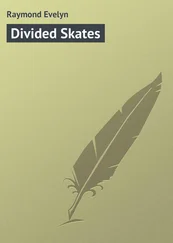CHAPTER EIGHTEEN

The next morning I slept in. Why show up on time when I wouldn’t even be going to class anymore? With the big blockade story to cover, there were a lot less reporters around town, making it much easier to get where I needed to go. When I finally rolled into school between fourth and fifth hour, I marched down the hallway in my MCUs, my tan combat boots clomping on the floor. Lots of conversations dropped to a whisper when I passed.
I’d come to school to officially drop out. All that meant was I wouldn’t be able to walk at graduation with the cap and gown. So what? The one person who would appreciate seeing me do that would be my mother, and right now the federal government wouldn’t even let her come home.
I probably should have gone to the office first, but I didn’t want to deal with Mr. Morgan. Instead, I went to Mr. Shiratori’s room. He was a great coach and the best teacher in the school, about the only one I could really stand. I couldn’t take off without saying anything to him.
No students were in the room, so it must have been his prep period. When I walked in, he sat slouched in his chair facing the screen. Some teachers had their screens on a lot before or after school, watching their favorite shows or listening to music while they graded assignments. Mr. Shiratori usually only used his screen to show us historical videos or for maps, charts, or graphs. But today he’d split the image into six different news feeds at once.
“In a televised address, Governor Montaine assured the nation and Idaho residents that he has been in touch with Idaho agricultural authorities and was confident that, although some items consumers are accustomed to would be scarce or unavailable, the nutrition needs of Idaho residents would be met despite, quote, ‘the president’s attempt to starve us out.’ The governor also announced plans to tap the deposits of silver found last year in the mountainous Payette National Forest region in order to compensate Idaho National Guard personnel with newly minted silver coins. The governor said, quote, ‘Idaho’s rich wealth in silver and other precious minerals is more than enough to pay the Idaho National Guard.’ ”
I stood by the door for a moment, waiting for him to say something, to even look at me. He didn’t. “Mr. Shiratori?”
He switched the sound to a different feed. “The president is on very shaky legal ground here. He’s relying on the precedent established by President Lincoln in 1861, when Lincoln ordered a blockade of the Confederate states by proclamation and without the express authorization of Congress. Despite facing heavy criticism suggesting that he has been too patient and lenient with the Idaho Crisis, after his strong action yesterday, the president’s poll numbers have actually dropped.”
Mr. Shiratori muted the sound. “Do you know why I teach American history and government, Mr. Wright?”
Did he really want an answer to that? It sounded like one of those questions he was about to answer himself, but he waited so long in silence that I thought I should say something. “Um, because they pay you?”
“Hmm.” He snorted and spun in his chair to face me. “I could make a lot more money doing something else. No, I have taught history and government here in this school for over fifteen years because I believe in America. Oh, don’t get me wrong. This country has made her fair share of mistakes. My great-grandparents were forced into internment camps during World War II. But even with his family imprisoned, my grandfather enlisted to fight in that war because he, like my father, like me, believed in America, in the philosophy behind its Constitution, in the purity of what America was supposed to be, what it could have been.” He waved his hand around in the air in front of him. “You know, equality and a decent chance to work hard to make something of your life.”
“It can still be that way,” I said.
“It looks like President Andrew Jackson was right way back in the 1830s. ‘Nullification means insurrection and war.’ We’re about to find out.”
“It won’t come to that,” I said.
“Really? You say that, and yet there you are in uniform, running off to serve in one army or the other.”
I dropped my duffel bag to the floor, unzipped it, pulled out my Minutemen game jersey, and held it out to him. He made no move to take it from me.
“I’m going to support the governor,” I said. “The Feds have trapped my mom plus Eric’s and Becca’s parents outside the state. Someone’s got to stand up to them. We can’t just let them trample our freedoms.”
“That’s a slogan, Mr. Wright. We are heading into a war. No matter what slogans help you march into it, if you’re lucky to survive long enough to hobble back out, it might be hard to remember what the slogan even meant, much less if it justified all that we’ve lost in its name.”
I stood there for a minute. Finally I put the jersey down on his desk. “Well, you’ve been a great teacher and coach, Mr. Shiratori.”
He stood up quickly and shook my hand with a firm grip. “Thank you, Mr. Wright. I’d try to talk you out of this if I thought it would do any good. So instead I’ll wish you luck, and I’ll be praying for you.”
I nodded and then headed for the door.
“Oh, and Danny,” he said, just before I walked out of his room. “I have the feeling this is going to get really bad. Be careful who you trust.”
* * *
I went to the office to sign out of high school. For once, Mr. Morgan didn’t lecture me too much. He didn’t even ask which side I was joining. He said that since the district hadn’t ever had a student unable to finish high school due to military service, he would have to review my situation with the school board to determine the next step. He said he’d do his best to help make sure I at least got my diploma. The guy was still a total jackwad, but I was impressed that he could be decent for once.
I went out to the Beast, started up the engine, and drove out of the parking lot for the last time. I’d called my Guard unit last night, and a female specialist whose name I didn’t recognize told me I could either report directly to the border checkpoint all the way on the other side of the mountain or wait at the armory for a truck to shuttle me out there at eighteen hundred hours. No way was I going to wait around all day. It was close to lunchtime, so I decided I’d stop by the Coffee Corner to eat before heading out. It would be cool having my own vehicle out on duty. Maybe some nights if there wasn’t much for me to do, they’d let me drive back into town to see JoBell.
The Coffee Corner was a crappy diner down on Main Street, the kind of place where old-timers and farmers stopped by after morning chores to have coffee, talk work and weather, and tell jokes. JoBell worked there sometimes. Alice seemed to work there all the time. She looked up from the comm she’d been reading. Everybody always checked out whoever came in, and today a couple reporters followed me in. That meant a lot of eyes on me. The conversation quieted.
“No media,” Alice called out. “Owner’s policy. You’ll have to wait outside for your story. Get out, or I’ll call the sheriff.”
When the reporters left, some people clapped.
“There he is!” said a farmer in overalls who sat with his friends at a table.
“The hero of the hour,” said a big man with a beard. He saluted.
I quickly sat down at the last stool at the counter. I didn’t know what they were making such a big deal about or why they were so happy, but I’d had more than enough attention.
Читать дальше













